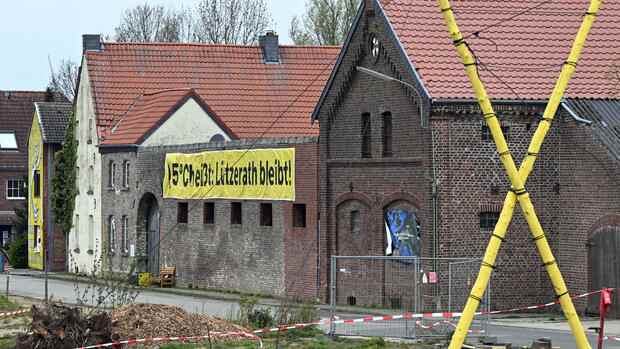Dusseldorf RWE boss Markus Krebber actually has every reason to be in a good mood. After all, he can present good figures to the shareholders at his first general meeting as CEO of Germany’s largest energy supplier. More sales, more profit, a higher dividend and a green strategy for the future of the former coal company.
Enkraft Capital has been trying to spin off RWE’s coal division for a year. Although the investor only holds 0.03 percent of the shares, he always manages to become a topic of conversation with letters to the supervisory board and management board.
The investor argues that the change in the business model from fossil to renewable energy sources is not going fast enough. Lignite and nuclear power in particular would become a financial risk for RWE.
Top jobs of the day
Find the best jobs now and
be notified by email.
“Acting with the crowbar without considering political and legal hurdles is not a solution. Any change to the plan with lignite can only be made with the consent of politicians,” emphasized RWE boss Krebber in his speech. They share the investor’s goal of increasing the value of the company, but a spin-off of the lignite division will in no way contribute to this.
Large shareholders criticize the activists’ move
The Executive Board and Supervisory Board of RWE, the municipal RWE shareholders and also large voting rights advisors such as Glass Lewis and ISS have spoken out against Enkraft’s application. “We don’t want to limit management’s options for action with a formal decision and weaken RWE’s negotiating position through tough time targets and disclosure of information,” says Ingo Speich, Head of Sustainability and Corporate Governance at Deka Investment, according to the text of the speech previously published at the Annual General Meeting . Therefore, vote against Enkraft’s shareholder proposal.
The head of sustainability/ESG in portfolio management at Union Investment, Henrik Pontzen, also rejected the proposal: “The environment is not helped if RWE emits less CO2 and another owner produces electricity from the Rhenish lignite.”
Nevertheless, the pressure on RWE is increasing. Bluebell Capital Partners, also an activist minority shareholder, also appealed in a letter to management to spin off the coal business from the rest of the company. “We don’t agree with Enkraft’s arguments, but the goal is the same,” a Bluebell representative told Handelsblatt.
However, they will vote against Enkraft’s proposal because they do not believe that shareholders should dictate the coal spin-off to the supervisory board. However, in a letter to company management, Bluebell also stressed that the arguments for rejecting RWE’s proposal were wrong.
“Due to the long time horizon of the transition to renewable energy, the sheer size of the investments required, the increased commitment of lenders and, most importantly, the blanket ban on most capital market providers lending to companies involved in the coal industry, the execution risk cannot be overestimated,” it says. The letter is available to the Handelsblatt. Ignoring this risk is “completely reckless”.
The managing directors of the Association of Municipal RWE Shareholders (VKA), Ingolf Graul and Udo Mager, contradicted this representation in an interview before the Annual General Meeting. The opposite is the case: “Things cannot be turned around overnight. Such a path requires a cushioning flanking,” stressed Graul. He referred to the consequences for jobs, the regional economy and trade taxes.
However, RWE was open to the idea of a coal foundation. The new federal government brought this into play in its coalition agreement. “The establishment of a foundation or company that organizes the dismantling of coal-fired power generation and renaturation is being examined,” it says at the end of the “Coal phase-out” section.
According to industry circles, the wording conceals a plan for a complicated barter transaction in which the operators of opencast lignite mines and power plants lose control of their assets, but could also get rid of incalculable risks.
However, details are not yet known. “We are actively involved in the discussions about a possible implementation,” said CFO Michael Müller at the virtual general meeting. “We are pleased that the Executive Board now sees the foundation solution we discussed in September as the preferred structure for the rapid separation of lignite activities from the RWE Executive Board,” said Enkraft CEO Benedikt Kormaier on Thursday. The board is now under pressure to deliver.
With their demands, Enkraft and Co. hit a nerve even without a successful vote. The pace of conversion to renewable energies is also too slow for other investors. “The way the group produces electricity is not sustainable. The goal of achieving climate neutrality by 2040 is a long way off,” criticized Speich from Deka Investment.
RWE should not rest on its laurels on its climate targets, it must reduce its emissions more quickly. Credible transformation means that ambitious goals are reliably pursued, emphasized Henrik Pontzen from Union Investment.
The declared goal of the new RWE strategy “Growing Green” is to invest a total of 50 billion euros in the new core business with renewable energies, natural gas and hydrogen by 2030. In addition, the green capacities are to increase from the current 25 to 50 gigawatts. RWE wants to double the profit from its core business by up to five billion euros by 2030 compared to the current financial year.
Of the almost 3.7 billion euros that the company invested last year, 83 percent went into wind power and solar energy. The largest single item was the investment in the British North Sea wind farm Triton Knoll.
More: RWE wants to become greener – but the profits bring coal and gas.



